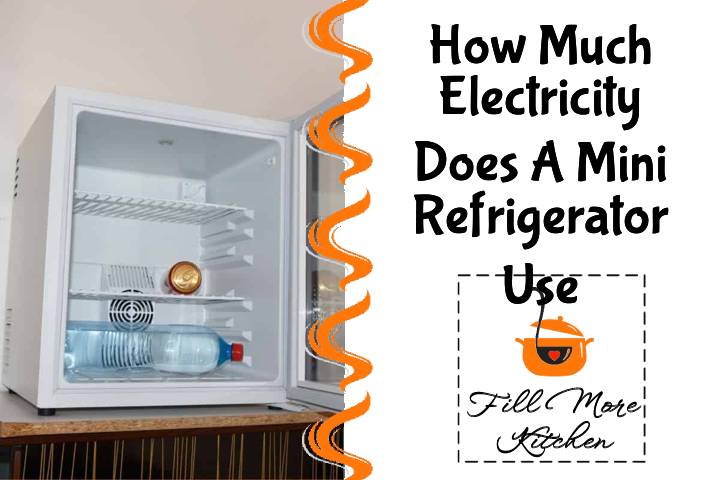For those who find mini refrigerators convenient, such as college students residing in dorms or sharing apartments with roommates, it is crucial to be aware of the electricity cost associated with using the appliance before making a purchase.
Typically, mini-refrigerators consume around 200 to 330-kilowatt hours (kWh) per year, but this amount may differ based on the refrigerator’s brand and size.
If you want to determine whether owning a mini-refrigerator is suitable for you, it’s essential to understand the advantages and disadvantages associated with it, such as its cost, operation, and differences from a full-size model.
How Much Does It Cost To Run A Mini Fridge? (Per Day/Week/Month/Year)
By multiplying the amount of electricity consumed by your mini-fridge per year with the average cost of electricity in the United States, which is approximately twelve cents per kWh, you can determine the yearly cost. After obtaining this figure, you can divide it to calculate the daily, weekly, and monthly expenses.
If your mini-refrigerator has an average annual consumption of 230 kWh, you can calculate the yearly cost by multiplying it with the rate of $0.12 per kWh, resulting in an estimated cost of around $28 per year to operate.
If you want to determine the monthly cost of running your mini refrigerator, you can perform simple calculations. By dividing the yearly cost of $28 by 12, which represents the number of months in a year, you will find that it will amount to approximately $2 per month.
To determine the weekly cost of operating your mini-fridge, divide the monthly cost of $2 by the average number of weeks in a month, which is 4, resulting in an estimated cost of approximately 50 cents per week.
To calculate the daily cost of operating a mini-fridge, divide the weekly cost of 50 cents by 7 days, resulting in an estimated cost of approximately 7 cents per day.
Usually, the majority of retailers selling mini-fridges will provide a label or details indicating the approximate amount of electricity it consumes on average. Being aware of this information can assist you in selecting the most suitable refrigerator that fits your needs and budget.
Does A Mini Fridge Run All the Time?
Mini-fridges, like regular refrigerators, have a compressor that cycles on and off during the day, but this can vary depending on factors such as daily usage.
Despite not being in operation constantly, the mini-fridge’s insulated design aids in maintaining the coldness of its contents even when the compressor cycle is inactive, signifying that it continues to function effectively even when it is not producing any sound.
When it comes to the duration of a mini-fridge’s operation, various factors usually play a role, and although the compressor may turn on and off, there are multiple ways to enhance its efficiency.
Regularly opening the door of a mini fridge can impact its power usage, so to save energy, it’s best to keep the door closed unless you need to access something inside.
Furthermore, it is crucial to maintain your mini-fridge properly after purchasing it. Regularly cleaning and servicing the appliance will not only increase its lifespan but also aid in reducing its power consumption.
Being aware that a mini-fridge should not operate continuously can assist you in detecting any issues with your appliance, which will result in cost savings on electricity use and preventing spoilage of the contents inside.
Are Mini Fridges Worth It?
When determining if a mini-fridge is a worthwhile investment, various factors such as cost, usage, and space should be taken into account; however, those who have bought one generally believe that it is a valuable purchase.
Assessing if a mini-refrigerator is suitable for your needs is crucial before buying one, and determining its impact on your electricity bill is a significant aspect that most individuals consider.
Moreover, it is important to consider how frequently you intend to use the mini refrigerator. Whether it will be used regularly for your daily needs or occasionally when watching sports in your personal space, having this information can assist you in making an informed choice.
Space is a crucial factor to consider before buying a mini-fridge as it may seem small, but the area where you plan to place it should be measured beforehand.
Overall, buying a mini refrigerator can be a wise decision if you intend to use it frequently, considering that the expense of operating the appliance is negligible, making it potentially valuable in the future.
Mini Fridge Vs. Full Size Energy Usage
Comparing a mini-fridge to a full-sized fridge reveals numerous advantages and disadvantages, with one of the most significant distinctions being the difference in energy consumption between the two models.
Although some people may argue that a mini-fridge consumes a significant amount of energy, it is still not as much as a full-sized refrigerator due to the latter’s larger size and higher energy consumption required to cool its interior.
Typically, full-sized refrigerators consume over 400 kWh annually. Therefore, to accurately compare costs for year-round usage, you must perform the same calculations as before based on identical time periods.
Suppose you are comparing the cost of running a full-sized refrigerator that consumes an average of 404 kWh per year, and the average cost in the United States is 12 cents; in that case, it will cost you approximately $48 annually to operate this unit.
Furthermore, dividing these expenses into daily, weekly, and monthly costs will provide more information for comparison purposes. This breakdown reveals that the mean expense of operating a full-sized refrigerator is $4 per month, $1 per week, and 14 cents per day.
When it comes to energy usage, a full-size refrigerator is pricier and consumes more electricity annually than a mini-fridge. However, this largely depends on the same factors mentioned earlier that affect the mini-fridge’s energy consumption. Neglecting proper maintenance or leaving the door open can result in increased energy usage.
It is crucial to consider the purpose and location of usage while comparing the two sizes of refrigerators. If a mini-fridge is used as the primary source of cold items, it can save money and space, but only a limited number of items can be stored.
Ultimately, when considering buying a mini-fridge, it is important to take into account a few key factors, including the amount of electricity it consumes, in order to determine its financial viability. Although a mini-fridge is less expensive than a full-size refrigerator, you must assess whether it aligns with your budget, lifestyle, and spatial requirements.
You can also check this video about “How Much Electricity Does A Mini Refrigerator Use?”
Check out our top 10 reviews!
Related posts
https://fillmorekitchen.com/best-milk-frother-for-oat-milk/
https://fillmorekitchen.com/why-does-my-pressure-cooker-leak/
https://fillmorekitchen.com/dishwasher-vs-hand-washing-the-ultimate-guide/
https://fillmorekitchen.com/does-food-taste-good-on-an-electric-grill/
https://fillmorekitchen.com/can-you-reheat-garlic-bread/



